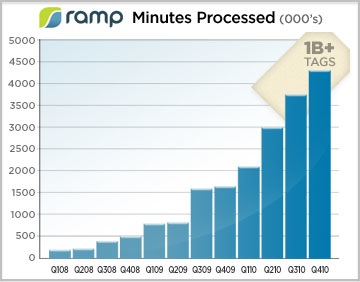-
RAMP Exceeds 1 Billion Time-Coded Tags For Video/Audio
RAMP is announcing this morning that it has processed 20 million minutes of video and audio for premium content publishers, to create over 1 billion time-coded "tags." The milestones reflect steady increases over the last 3 years (see chart below). Tags are descriptive metadata which are essential to video being discovered, shared and optimally monetized. Last week I spoke to RAMP's CEO Tom Wilde who gave me additional insight on how the company is doing and its place in the online video ecosystem.
Tom said the biggest change he's seen in the market is the dramatically increased understanding of metadata's value. Whereas a year ago it was perceived as a "nice to have," now content providers recognize that it is essential to driving their video businesses. That's because the web is awash with video, and so it's getting ever-harder for users to find just the video they want, whether it's a short clip or a full-length program. Metadata allows video to be search-engine optimized, helping drive improved discoverability and satisfaction. Once within a site itself, the ability to accurately search across it, share and navigate with thumbnails increases session time and monetization. In its research analyzing 3 sites that have incorporated RAMP's features, session time was found to increase by 4x.
Enabling users to find just those clips or shows they want helps viral distribution, another key traffic generator. All of this can help better target ads that yield higher CPMs. Importantly, metadata allows content providers to integrate appropriate videos at the right time, to enrich the user experience. Tom cites the example of CNBC, which uses RAMP to process all of its videos, and then syndicate them to other third-parties, like Reuters. RAMP currently powers metadata creation and management for NBCU, Fox, Hearst, Meredith, and PBS, among others, plus a major sports league which will be announced soon.
Looking ahead, Tom sees metadata and discovery as becoming even more essential as the landscape becomes more complex. A key part of this is the explosion of video-capable devices like smartphones and tablets that provide even more opportunity for rich, interactive experiences built around relevant video. In addition, business models are dynamic, with a mix of free and paid services, along with the rights to playback and share constantly evolving. In Tom's view, the underlying discovery engine will always be metadata. For companies like RAMP and others in the metadata management space like Digitalsmiths, Thought Equity Motion and others, that means lots of potential ahead.
What do you think? Post a comment now (no sign-in required).Categories: Technology
Topics: RAMP

